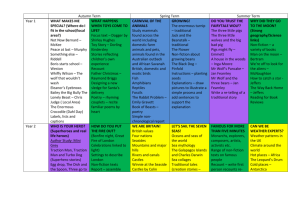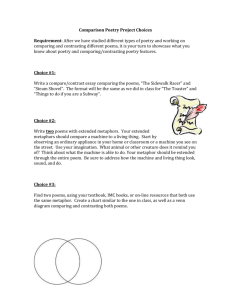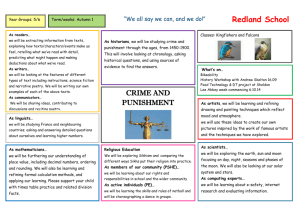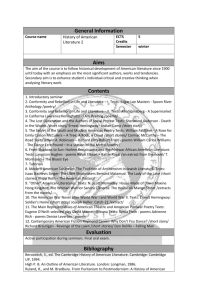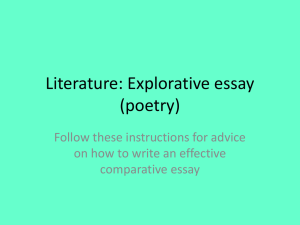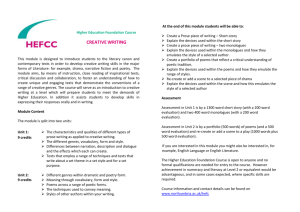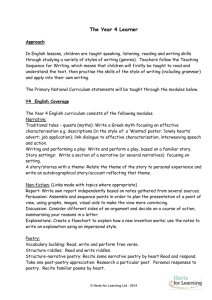The Year 5 Learner Approach In English lessons, children are
advertisement
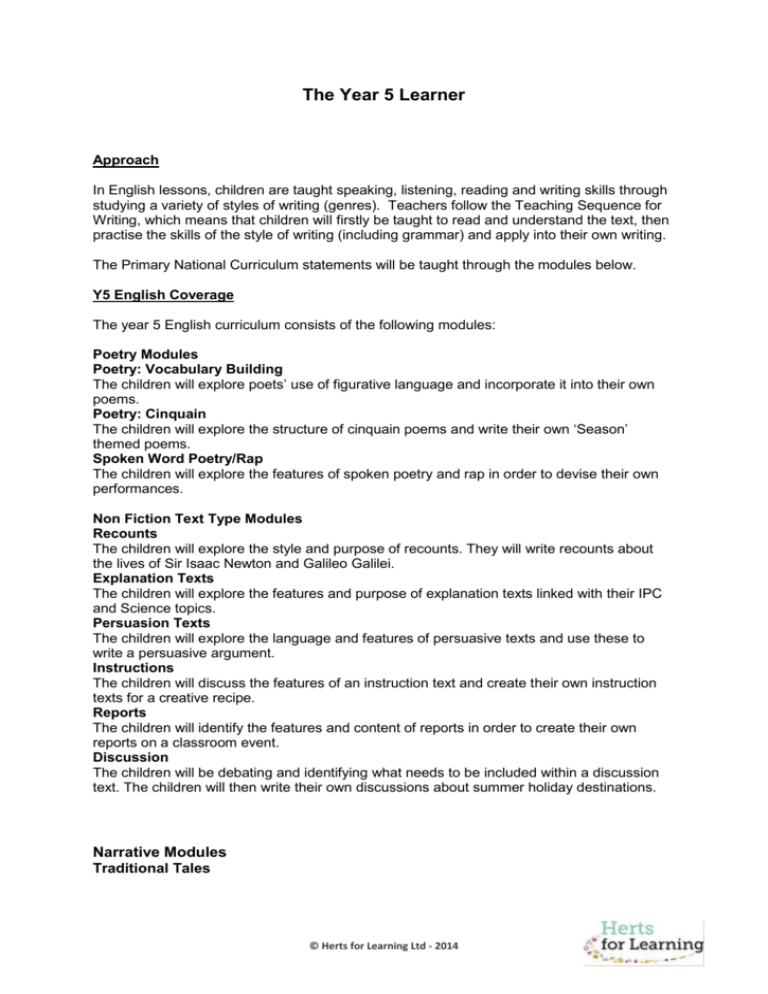
The Year 5 Learner Approach In English lessons, children are taught speaking, listening, reading and writing skills through studying a variety of styles of writing (genres). Teachers follow the Teaching Sequence for Writing, which means that children will firstly be taught to read and understand the text, then practise the skills of the style of writing (including grammar) and apply into their own writing. The Primary National Curriculum statements will be taught through the modules below. Y5 English Coverage The year 5 English curriculum consists of the following modules: Poetry Modules Poetry: Vocabulary Building The children will explore poets’ use of figurative language and incorporate it into their own poems. Poetry: Cinquain The children will explore the structure of cinquain poems and write their own ‘Season’ themed poems. Spoken Word Poetry/Rap The children will explore the features of spoken poetry and rap in order to devise their own performances. Non Fiction Text Type Modules Recounts The children will explore the style and purpose of recounts. They will write recounts about the lives of Sir Isaac Newton and Galileo Galilei. Explanation Texts The children will explore the features and purpose of explanation texts linked with their IPC and Science topics. Persuasion Texts The children will explore the language and features of persuasive texts and use these to write a persuasive argument. Instructions The children will discuss the features of an instruction text and create their own instruction texts for a creative recipe. Reports The children will identify the features and content of reports in order to create their own reports on a classroom event. Discussion The children will be debating and identifying what needs to be included within a discussion text. The children will then write their own discussions about summer holiday destinations. Narrative Modules Traditional Tales © Herts for Learning Ltd - 2014 The children explore themes, plots, structure and character description in order to write an adaption of their own traditional tale. Suspense and Mystery The children will identify the features of suspense and mystery writing and the effect this has on the reader. This will then lead to the children writing their own Suspense and mystery narrative. Fiction from our Literacy Heritage The children will be reading a range of classic texts to enhance their understanding of our Literacy Heritage. Take One Book The children will be exploring novels in greater depth. This will deepen their understanding of themes, characters and plot development. One example is ‘The terrible thing that happened to Barnaby Brocket’ by John Boyne Recommended reading list (a variety is best) : The books the children might study include: Significant authors: Street Child By Berlie Dogherty The Secret Garden By Frances Hodgson Burnett Various By Michael Morpurgo Why The Wales Came By Michael Morpurgo Warhorse By Michael Morpurgo Kensuke’s Kingdom By Michael Morpurgo The Witches By Roald Dahl Artemis Fowl By Eoin Colfer Madame Doubtfire By Anne Fire Frozen Billy By Anne Fine Traditional Tales Aesop’s Funky Fables By Vivian French Silver Myths and Legends of the World By Geraldine McCaughrean Golden Myths and Legend of the World By Geraldine McCaughrean Greek Heroes By Geraldine McCaughrean Various (Orchard Myths) By Geraldine McCaughrean Stories from other cultures The Jessame Stories By Julia Jarman Various (poetry) By Valerie Bloom Grandpa Chatterji By Jamilla Gavin A Little Piece Of Ground By Elizabeth Laird The Pearl Diver By Julia Johnson The colour of Home By Mary Hoffman The Firework Makers Daughter By Philip Pullman Older Literature Oliver Twist By Charles Dickens Great Expectations By Charles Dickens Black Beauty By Anna Sewell Shakespeare – The Tempest By Leon Garfield The Christmas Carol By Charles Grahame The Wind In The Willows By Kenneth Grahame The Box of Delights By John Masefield © Herts for Learning Ltd - 2014 Alice in Wonderland By Lewis Carol Macbeth By William Shakespeare Midsummer Nights Dream By William Shakespeare Narrative Carrie’s War By Nina Bawden Goodnight Mr Tom By Michelle Magorian The Iron Giant By Ted Hughes The Snowman By Raymond Briggs. Poetry The Highway Man by Alfred Noyes Assorted poems by Pie Corbett Assorted poems by Andrew Fusek Peters Assorted poems by Valerie Bloom Assorted poems by William Blake A selection of cinquain from ‘The Works Volume 1’ Other poems by Valerie Bloom, Jack Ousbey Brian Moses Curriculum Content Speaking and Listening Children will be taught to discuss their learning and to develop speaking skills. They will become more familiar with and confident in, using language in a variety of situations, for a range of audiences and purposes. They will, for example Develop their understanding of a subject through discussions, learning to give their opinions and listen to other viewpoints. Speak clearly and in different ways for drama, formal presentations and debate. Reading This part of the curriculum is broken down into ‘word reading’ and ‘comprehension’. In year 5, pupils will be reading aloud a wider range of poetry and books written at an ageappropriate interest level with accuracy and at a reasonable speaking pace. Children will be expected to read frequently, outside as well as in school, for pleasure and information. They will have the opportunity to listen frequently to stories, poems, non-fiction and other writing. At this stage, word reading will not be directly taught, except where individuals need support. Instead the focus will be on the teaching of comprehension skills. They will, for example: Retrieve, record and present information from a text Summarise the main ideas of a text eg ‘loneliness’ or ‘friendship’ Predict what may happen based on evidence and clues given Discuss and evaluate the text and justify their views Use clues from the text to work out characters’ feeling, actions or motives Distinguish between fact and opinion Identify how language, structure and presentation add to the meaning Compare different texts We are able to provide you with lists of age appropriate texts to support the learning. © Herts for Learning Ltd - 2014 Writing Writing is developed through teaching the following: Spelling: Children should learn to spell new words correctly and have opportunities to practise spelling skills. They will be taught spelling patterns and conventions, and draw on their knowledge of word families and roots to help them spell new words correctly. They will practise and use the words included in Appendix 1 of the National Curriculum for years 5 & 6. Children will be expected to use a dictionary and thesaurus. Handwriting: Pupils will continue to be taught handwriting in order to increase speed, fluency and legibility. Composition (structure): This includes vocabulary, grammar and punctuation. To develop their composition skills, the children will be taught to Plan, draft, compose, edit and evaluate their writing Use a wide variety of punctuation and grammar features Select the appropriate grammar and vocabulary to develop the effectiveness of their writing Use a range of techniques to build detail into their writing and link ideas within and between paragraphs Adapt writing for a range of purposes and audiences as part of their work across the curriculum. In year 5 this will include (cross curricular example, schools to insert their own) Grammar will be taught throughout the writing process and teachers will follow the terms and concepts of Appendix 2 of the National Curriculum. Should you wish for a more detailed explanation, please follow this link to the Primary National Curriculum document © Herts for Learning Ltd - 2014

